中职英语-Unit-4PPT课件
- 格式:ppt
- 大小:310.00 KB
- 文档页数:12
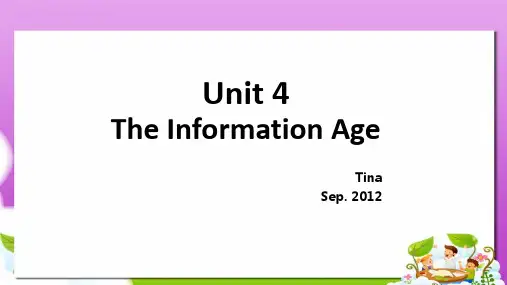


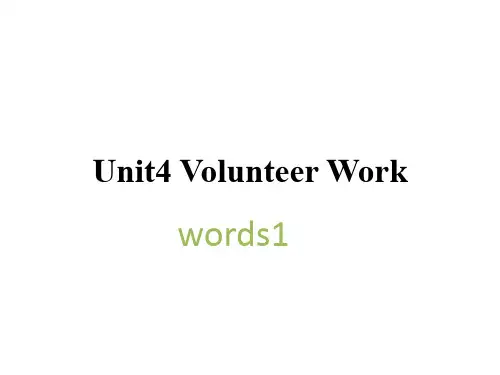



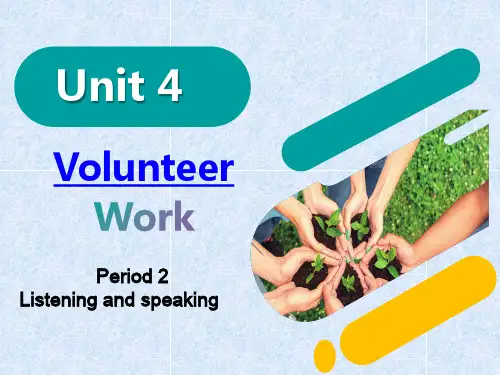
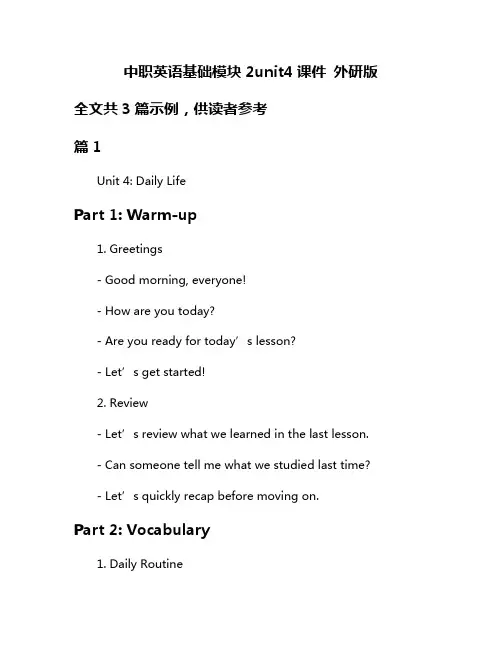
中职英语基础模块2unit4课件外研版全文共3篇示例,供读者参考篇1Unit 4: Daily LifePart 1: Warm-up1. Greetings- Good morning, everyone!- How are you today?- Are you ready for today’s lesson?- Let’s get started!2. Review- Let’s review what we learned in the last lesson.- Can someone tell me what we studied last time?- Let’s quickly recap before moving on.Part 2: Vocabulary1. Daily Routine- Brush teeth- Wash face- Have breakfast- Go to work/school- Have lunch- Do homework/study- Have dinner- Take a shower- Go to bed2. Expressions- What time is it?- What’s the date today?- Have a good day!- Good night!- See you later!Part 3: Listening Practice1. Listening Comprehension- Listen to the audio and answer the questions.- Pay attention to the keywords and try to understand the main ideas.2. Dialogue Practice- Work with a partner to practice the dialogues.- Pay attention to pronunciation and intonation.Part 4: Grammar1. Present Simple Tense- I brush my teeth every morning.- She goes to work by bus.- We have dinner at 7 o’clock.- They study English on weekends.2. Time Expressions- Every day/week/month- In the morning/afternoon/evening- At 6 o’clock/12 noon/midnight- On Monday/Tuesday/FridayPart 5: Speaking Practice1. Interview Activity- Interview a classmate about their daily routine.- Take notes and share with the class.2. Role Play- Act out a typical day in your life.- Use the vocabulary and expressions we’ve learned. Part 6: Writing Task1. Daily Journal- Write a journal entry about your day.- Include details about your routine and any special events.2. Email Writing- Write an email to a friend describing what you did today.- Use the present simple tense and time expressions. Part 7: Review Game1. Daily Life Quiz- Test your knowledge with a fun quiz.- Earn points for correct answers and compete with your classmates.2. Wrap-up- That’s all for today’s lesson. Well done, everyone!- Remember to practice what we’ve learned and review for the next class.- See you next time! Have a great day!篇2Unit 4: Making PlansPart 1: VocabularyIn this unit, we will learn some vocabulary related to making plans. Let's start with some common words and phrases:1. Arrange: to make plans or preparations for somethingExample: We need to arrange a meeting to discuss the project.2. Schedule: a plan that shows the times that events will happen or the things that people have to doExample: What's your schedule for tomorrow?3. Confirm: to say or show that something is true or correctExample: Please confirm your attendance at the meeting.4. Reschedule: to set a new time or date for something that has been plannedExample: We had to reschedule the meeting for next week.5. Postpone: to arrange for something to happen at a later time than originally plannedExample: The concert has been postponed due to bad weather.6. Cancel: to decide that an event will not happenExample: The workshop has been canceled due to low attendance.Part 2: GrammarIn this unit, we will also learn some grammar structures used for making plans. Let's look at a few examples:1. Present Continuous for Future ArrangementsWe use the present continuous tense to talk about future plans that are already fixed or arranged.Example: I'm meeting Sarah for lunch tomorrow.2. Going To for Future PlansWe use "going to" to talk about future plans that we have already decided or intend to do.Example: I'm going to study abroad next year.3. Will for Future DecisionsWe use "will" to make decisions at the moment of speaking.Example: I'll call you when I arrive.Part 3: Speaking PracticeNow, let's practice making plans using the vocabulary and grammar structures we have learned in this unit. Here are some conversation prompts to help you get started:1. What are your plans for this weekend?2. Have you arranged your schedule for next week?3. Are you going to attend the party on Saturday?4. Do you need to reschedule our meeting?5. Will you confirm your attendance at the event?Remember to use the vocabulary and grammar structures we have learned to communicate effectively when making plans. Good luck!篇3Unit 4 of the Basic Module 2 of Vocational English in the New Foreign Version covers a variety of topics related to work and employment. In this unit, students will learn how to describe job responsibilities, discuss career goals, and understand workplace etiquette.The unit begins with a discussion on different types of jobs and industries, helping students expand their vocabulary related to work. They will learn common job titles and descriptions, as well as the skills and qualifications needed for various professions.Next, students will explore the concept of job responsibilities and how to effectively communicate these to others. They will practice using modal verbs to express obligations and duties in the workplace, as well as discuss the importance of teamwork and collaboration in achieving common goals.Following this, the unit delves into the topic of career goals and aspirations. Students will learn how to talk about theirlong-term career objectives and the steps they need to take to achieve them. They will also discuss the importance of continuous learning and professional development in pursuing a successful career.Additionally, the unit covers workplace etiquette and professional communication. Students will learn how to communicate effectively with colleagues and supervisors, as well as handle conflicts and feedback in a constructive manner. They will also explore the dos and don'ts of office conduct, including appropriate dress code and email etiquette.Overall, Unit 4 of the Basic Module 2 of Vocational English in the New Foreign Version provides students with the necessary language skills and cultural awareness to succeed in the modern workplace. By mastering the concepts and practicing the language exercises in this unit, students will be better equipped to navigate the complexities of the professional world and achieve their career goals.。
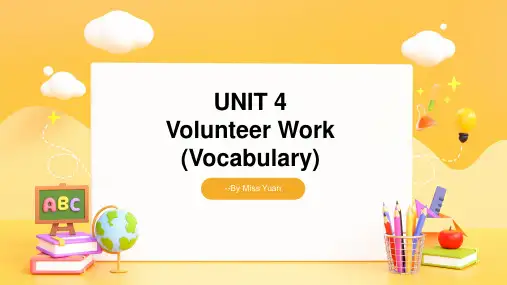

Unit 4 Welcome to our party一.知识点1. 招待客人:Welcome to my party!Would like some coffee?Would like something to drink?What would you like?Your beer with or without ice?Please help yourself (to some fish / apples).Please make yourself at home.2. 介绍客人: This is Mr. Smith. He is my guest.3. 谈论天气: What’s the weather like in Beijing?= How is the weather in Beijing?It’s pleasant / sunny but cold4. invite (v.)邀请invitation .(n) 邀请;请帖I would invite some friends (over) to watch TV together.I also want to invite some other classmates to the party.5.tell jokes 讲笑话6.want to do sth. 想要做某事want sb. to do sth. 想要某人做某事I just wanted to know if everything was all right.Do you want me to help?7.have fun 玩得开心have fun together.8.regards regards.9.People greet each other by kissing in some countries.greet sb.问候某人,和某人打招呼She greeted us with a smile.by doing sth.通过做… by doing something you love.10.The way to greet a British person for the first time is to shake handswith him or her.the way to do sth.做…事的方法/方法for the first time 第一次shake hands with sb. 和某人握手The way to win is to lose. 若想赢,就要去输I came to this school for the first time.He shook hands warmly with me.11.Don’t pat (拍)him or her on the back.pathit sb. +介词(in/ on/ by)+the +身体的部位beat该固定结构意为“拍或打了某人某处”Eg: The man beat the boy on the back.那人打了孩子的背部。